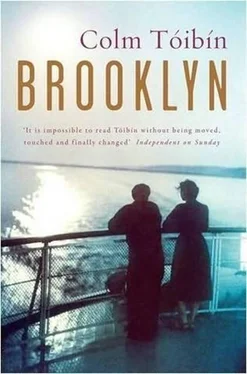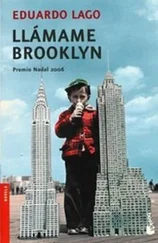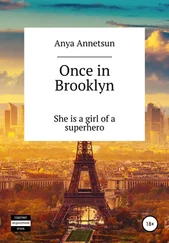Later, Nancy and George walked together towards Ballyconnigar, leaving Eilis and Jim to follow. Jim began to ask her questions about America. He said he had two uncles in New York and he used to imagine them among the skyscrapers of Manhattan until he found out that they were two hundred miles from New York City. It was in New York State, he said, and the village one of them was in was smaller than Bunclody. When she told him that a priest, who had been a friend of her sister, had encouraged her to go and helped her there, he asked her the name of the priest. When she said Father Flood, she was taken aback for a moment when Jim Farrell said that his parents knew him well; his father, he thought, had been in St. Peter's College with him.
Later, they drove to Wexford and had their tea in the Talbot Hotel, where the wedding party was going to be held. When they got back to Enniscorthy, Jim invited them to have a drink in his father's pub before going home. His mother, who was serving behind the bar, knew all about their outing and greeted Eilis with an effusive warmth that Eilis found almost unsettling. Before they parted, they agreed that they would repeat the outing the following Sunday. George mentioned the possibility of going from Curracloe to the dance in Courtown.
Eilis had no key to the front door of the house in Friary Street so she had to knock; she hoped that her mother was not asleep. She could hear her coming slowly to answer the door and thought she must have been in the kitchen. Her mother spent some time opening locks and pulling back bolts.
"Well, here you are," her mother said, and smiled. "I'll have to get you a key."
"I hope I didn't wake you."
"No, when I saw you going off I thought to myself that you'd be back late, but it isn't that late because there's still a bit of light in the sky."
Her mother closed the door and led her towards the kitchen.
"Now, tell me something," she said, "did you have a great outing?"
"It was nice, Mammy, and we went to Wexford for our tea."
"And I hope that Jim Farrell wasn't too ignorant?"
"He was fine. Minding his manners."
"Well, the big news is that Davis's offices sent up for you and they have a crisis because all the lorry drivers have to be paid tomorrow and so do all the men working in the mill and one girl is on her holidays and Alice Roche is sick and they were at their wits' end when someone thought of you. And they want you to be there at half past nine in the morning, and I said you would be. It was better to say yes than no."
"How did they know I was here?"
"Sure the whole town knows you're here. So I'll have your breakfast on the table at half past eight and you'd better wear sensible clothes. Nothing too American now."
Her mother had a smile of satisfaction on her face and this came as a relief to Eilis, who had, over the previous days, begun to dread the silences between them and resent her mother's lack of interest in discussing anything, any single detail, about her time in America. They spoke now in the kitchen about Nancy and George and the wedding and arranged to go to Dublin the following Tuesday to buy an outfit for the day. They discussed what they should buy Nancy as a wedding present.
When Eilis went upstairs she felt, for the first time, less uneasy about being home and found that she was almost looking forward to the day dealing with wages at Davis's and then the weekend. As she was undressing, however, she noticed a letter on the bed and instantly saw that it was from Tony, who had put his name and address on the envelope. Her mother must have left it there, having decided not to mention it. She opened it with a feeling close to alarm, wondering for a second if there was anything wrong with him, relieved when she read the opening sentences that declared his love for her and emphasized how much he missed her.
As she read the letter she wished that she could take it downstairs and read it to her mother. The tone was stiff, formal, old-fashioned; the letter was clearly by someone not used to writing letters. Yet Tony managed to put something of himself into it, his warmth, his kindness and his enthusiasm for things. And there was also something there all the time in him, she thought, that was in this letter too. It was a feeling that were he to turn his head, she might be gone. That afternoon, as she had enjoyed the sea and warm weather and the company of Nancy and George and even, towards the end, Jim, she had been away from Tony, far away, basking in the ease of what had suddenly become familiarity.
She wished now that she had not married him, not because she did not love him and intend to return to him, but because not telling her mother or her friends made every day she had spent in America a sort of fantasy, something she could not match with the time she was spending at home. It made her feel strangely as though she were two people, one who had battled against two cold winters and many hard days in Brooklyn and fallen in love there, and the other who was her mother's daughter, the Eilis whom everyone knew, or thought they knew.
She wished she could go downstairs now and tell her mother what she had done, but she knew she would not. It would be simpler to claim that work called her back to Brooklyn and write then, when she had returned, to say that she was seeing a man whom she loved and hoped to get engaged to and married to. She would only be home for less than two more weeks. As she lay in bed she thought it would be wise to make the best of it, take no big decisions in what would be an interlude. A chance to be at home like this would be unlikely to come her way again ever. In the morning, she thought, she would get up early and write to Tony and post the letter on her way to work.
In the morning it was hard not to think that she was Rose's ghost, being fed and spoken to in the same way at the same time by her mother, having her clothes admired using the same words as were used with Rose, and then setting out briskly for work. As she took the same route Eilis had to stop herself walking with Rose's elegant, determined walk, and move more slowly.
In the office Maria Gethings, about whom Rose used to talk, was waiting for her and brought her into the inner sanctum where the cash was kept. The problem was, Maria said, that this was the busy season and all the lorry drivers and the men working in the mill had done overtime the previous week. They had filled out their hours but no one had worked out the money they were due, which was set out on a special form and added to their usual wages, which came with another form, a wage slip. They were not even in alphabetical order, Maria said.
Eilis said that if Maria left her alone for about two hours with all the information about the rates at which overtime was paid, she would work out a system, as long as she could ask Maria questions whenever she needed. She said that she would function best on her own but she would let Maria know if she had even the smallest query. Maria said that she would close the door and leave her undisturbed in this office, mentioning on her way out that the men usually came for their wage packets at around five and the money was in cash in the safe to pay them with.
Eilis found a stapler and began to attach the overtime form for each man to his normal wage sheet. She put them in alphabetical order. When she had all of them done, she went through each overtime form, calculating from the list of rates, which varied considerably depending on years of service and levels of responsibility, how much each man was owed and then adding this to his wages on the wage sheet, so that there was a single figure for each man. She wrote this figure on a separate list, which she then had to tot up to find out how much money was needed to pay the men everything they were owed. The work was straightforward because the terms were clear, and, so long as she concentrated on making no mistakes in the addition, she thought she would be able to complete the task, provided there were enough loose notes and coins in the safe.
Читать дальше












